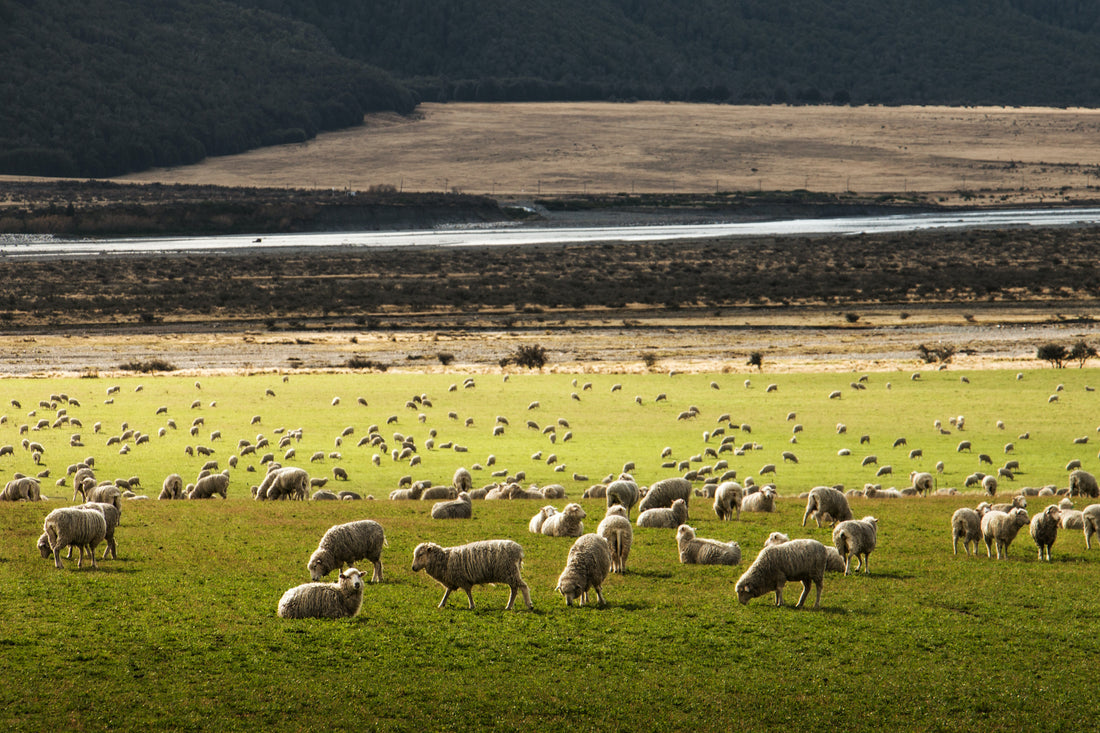
Merino wool: advantages, origin and care
The Merino sheep is a fine wool sheep breed that gained great economic importance in the 19th century because of its desirable wool. Merino sheep are now bred worldwide, with Australia and New Zealand being the largest wool producers with around 100 million sheep worldwide.
Merino wool accounts for about 40% of the world's annual wool sales and virtually all of it is produced in Australia. This is where the most common criticism of Merino arises. In Australian Merino wool production, the practice of mulesing, where part of the animal's skin around the tail is removed without anaesthesia, is widespread. This is done to prevent fly infestation and to ensure that wool quality is not compromised. The questionable practice, which is permitted in Australia, has been repeatedly denounced as animal cruelty by animal welfare organizations worldwide. The origin of merino wool used in garments must therefore be carefully checked.

Dagsmejan uses exclusively mulesing-free merino wool from NATIVATM for the Stay Warm collection. The wool is obtained in Uruguay and is 100% traceable. This ensures that the products are ethically & sustainably produced. The innovative NATTWARMTM fabric combines the finest merino wool with eucalyptus fibres to create a unique fabric that is 50% lighter than other fabrics with the same warmth properties and guarantees the best moisture management.
Merino sheep can be sheared once or twice a year, yielding between two and four kilograms of wool. If the shearing is done carefully, it is not a torture for the animal and can even be perceived as a relief as merino sheep do not lose their wool by themselves.
Advantages of Merino
1. Natural insulating ability
Merino wool is repeatedly referred to as nature's high-tech fibre. Why is this so? Merino has an amazing natural insulating ability, both in winter and summer: the air pockets that are abundant in the fibres not only protect against the cold, but also keep one cool in warm temperatures.

2. Keeps moisture away from the skin
Although the surface of the merino fibre repels water, it can absorb up to a third of its own weight in moisture on the inside. So, if one starts to sweat, the moisture is quickly transported away from the skin and stored inside the fibre. The surface remains dry, which is why the material does not feel damp despite sweating.
Thanks to these two properties, merino optimally supports the body's own temperature regulation.
3. Antibacterial - no odor development
Merino wool is naturally antibacterial. The wool fat (lanolin) found in the fibre prevents bacteria from settling, which is responsible for the unpleasant odour when sweating. Thus, garments made of merino remain fresh even after prolonged wear.
4. Works against skin irritations
The temperature and moisture regulating properties of merino wool create a microclimate that is very beneficial for sensitive skin. Studies conducted by Woolmark in collaboration with the Murdoch Childrens Research Institute in Melbourne have shown that wearing merino wool can be therapeutic for eczema conditions.
5. Natural & sustainable
When merino wool is obtained correctly (without harming the animal), it is a very sustainable resource. It grows back completely, so it is renewable and can also be broken down without leaving any residue.
Merino in comparison: cotton, synthetic fibres, and others
As mentioned above, merino has numerous advantages. For a better understanding, the table below shows how the natural fibre compares to other textiles.
Depending on the extraction and processing of the respective fibre, large differences can occur especially in sustainability. We therefore recommend to always pay attention to the origin and processing of the materials when buying products. Certified fabrics are usually much more sustainable (e.g. OEKO TEX etc.).

Clothing made of Merino
Clothing has been made from wool for many centuries. Thus, the material has always been popular mainly because of its good insulating properties and durability.
While clothing made of pure new wool is still considered by many to be a classic winter accessory, merino is already a step ahead. The material has established itself above all as the ideal companion for outdoor activities. And not just in winter. Thanks to its outstanding insulating properties, clothing made of merino is popular all year round.
But merino has not only arrived in the outdoor sector. It is also popular for everyday clothing. The comfort as well as the absence of unpleasant odours is a big advantage.
Pyjamas made of Merino
Pyjamas made of merino? Why not! The properties for which merino is so highly valued for in the field of functional clothing also make the material the ideal companion for a quiet, relaxing night. For example, merino wool pyjamas support one’s natural temperature regulation and ensure to maintain the right temperature throughout the night.
Night sweats are also not a problem with merino pyjamas. The fabric absorbs excess moisture and transports it away from the skin as quickly as possible. The antibacterial properties of the material also ensure that the pyjamas remain fresh even after being worn several times.
Pyjamas by Dagsmejan: Merino meets eucalyptus

In the Stay Warm collection from Dagsmejan, two super fibres come together - the finest merino wool and micromodal from eucalyptus. The result: breathable, feather-light warmth. The NATTWARM fabric developed especially for the collection is 2x softer and 50% lighter than cotton.
Washing & care of merino wool
Proper care of merino wool is not rocket science. If you consider a few basic points, you will enjoy your garment for a long time.
In general, merino wool clothing does not need to be washed too often; often it is enough to air out the garment well. If you do have to wash your merino T-shirt or merino sweater, you should consider the following:
- Do not wash too warm: max. 30-40° C.
- Use a special wool detergent (Important: Be sure to use detergents without enzymes, some wool detergents still contain enzymes). As an alternative, baby shampoo can also be used.
- Do not dry in the dryer, it is best to let it dry lying down.
- No fabric softener, no bleach
- Follow the manufacturer's care instructions






